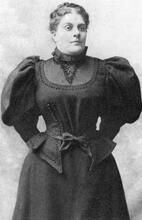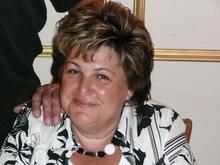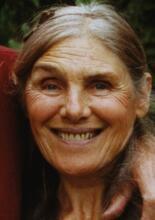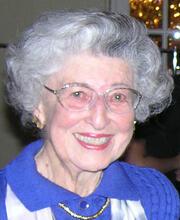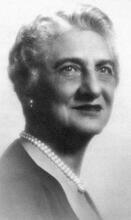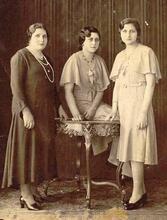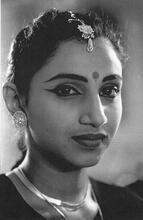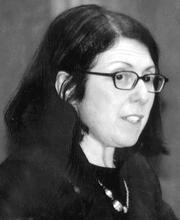Edith Jacobi Baerwald
Edith Jacobi Baerwald devoted her energy to philanthropic organizations, but she also loved connecting directly with the people she helped through her volunteer work at settlement houses. Baerwald volunteered as a dance teacher at various settlement houses on New York’s Lower East Side, continuing her friendships with the young women she met at those dance clubs despite their social and economic differences. After marrying Paul Baerwald, a founding member of the Joint Distribution Committee that raised money to help Jews overseas, Baerwald became active in both the JDC and the Federation of Jewish Philanthropies. She served on the Women’s Auxiliary Board of Mount Sinai Hospital for more than thirty years. She was also a founding member of the Greater New York United Jewish Appeal and honorary chair of its women’s division, as well as honorary vice president of the Girls and Boys Service League.
It was Edith Jacobi Baerwald’s fascination with New York City and her humanitarian vision that inspired her to commit her life to social action.
Early Life & Work
She was born in 1878 to the prominent Jacobi family of San Francisco. Her parents had both come to America from Germany. Her mother’s family, the Brandensteins, settled in San Francisco as peddlers during the time of the California Gold Rush. Her father came to America as an immigrant, ultimately settling with his brother in California as a wine merchant. The two Jacobi brothers established a successful wine-selling business in San Francisco, and both married Brandenstein sisters.
When Edith was nearly twelve years old, she and her family began to spend summers in New York City. Enthralled with New York even at that young age, she expressed a desire to attend school on the East Coast. Therefore, it was in New York City, as a volunteer at the University Settlement on the Lower East Side of Manhattan, that she developed a passion for helping others through social work.
Although Baerwald was born into a privileged, upper-class family, her wealth did not isolate her with respect to social class. She was deeply interested in the social structure of New York City, and recognized her ability to contribute to the lives of others less fortunate than herself. She considered volunteer work a social obligation, and poured her time and tireless energy into numerous projects. She especially loved her work as a dance teacher at the Lower East Side settlement houses, where she developed friendships with Jewish women of social and economic backgrounds quite different from her own. Even after the demise of those dance clubs, she and a group of young Jewish women she had met at the University Settlement continued their friendship. They would meet regularly for coffee or for a meal, often at Baerwald’s elegant home—a world apart from that of the settlement houses.
Family & Legacy
Although surrounded by men from prominent families with impressive backgrounds, she led an active and independent life, and did not choose to marry until age thirty. In 1908, she married Paul Baerwald, a partner in the brokerage firm of Speyer and Brothers in London. Baerwald, born in Germany, came to New York in 1898 from England, where he had been an active Jewish philanthropist. A founding member of the Joint Distribution Committee (JDC), a major American agency for the relief of distressed Jews overseas, he shared his wife’s commitment to social activism and concern for those in need. A partner in the New York firm of Lazard Frères from 1907 to 1930, he retired in order to devote himself full-time to philanthropy. During their life together and after her husband’s death at age eighty-nine on July 2, 1961, Baerwald remained actively involved with the JDC and the Federation of Jewish Philanthropies. She was a founding member of the Greater New York United Jewish Appeal and served as honorary chair of its Women’s Division. In addition, she served as a member of the Mount Sinai Hospital Women’s Auxiliary Board for more than thirty years, and was honorary vice president of the Girls and Boys Service League.
Paul and Edith Baerwald had four children: a son, Herman, and three daughters, Pauline Falk, Jane Aron, and Florence Doubilet. The Baerwald children carried on their proud family tradition of philanthropy through continued affiliation with the Federation of Jewish Philanthropies and the Joint Distribution Committee. In addition, Pauline Falk was president of Jewish Family Services and a founder of the New Lincoln School, an institution committed to progressive education.
Edith Jacobi Baerwald died at age eighty-seven on August 8, 1965, in Neptune, New Jersey. Through her deep appreciation for the humanity of all people, she recognized the important role social work could play in bettering the lives of poor and oppressed Jews and non-Jews in the United States and Europe. While she considered it her duty as a woman of means to bring assistance to those in need, her accomplishments were driven by a profound sense of personal commitment and respect for those whose lives she touched.
AJYB 67 (1966): 531.
Falk, Pauline. Interview with author, October 8, 1996.
NYTimes, July 3, 1961, and Obituary. August 10, 1965, 29:4.

